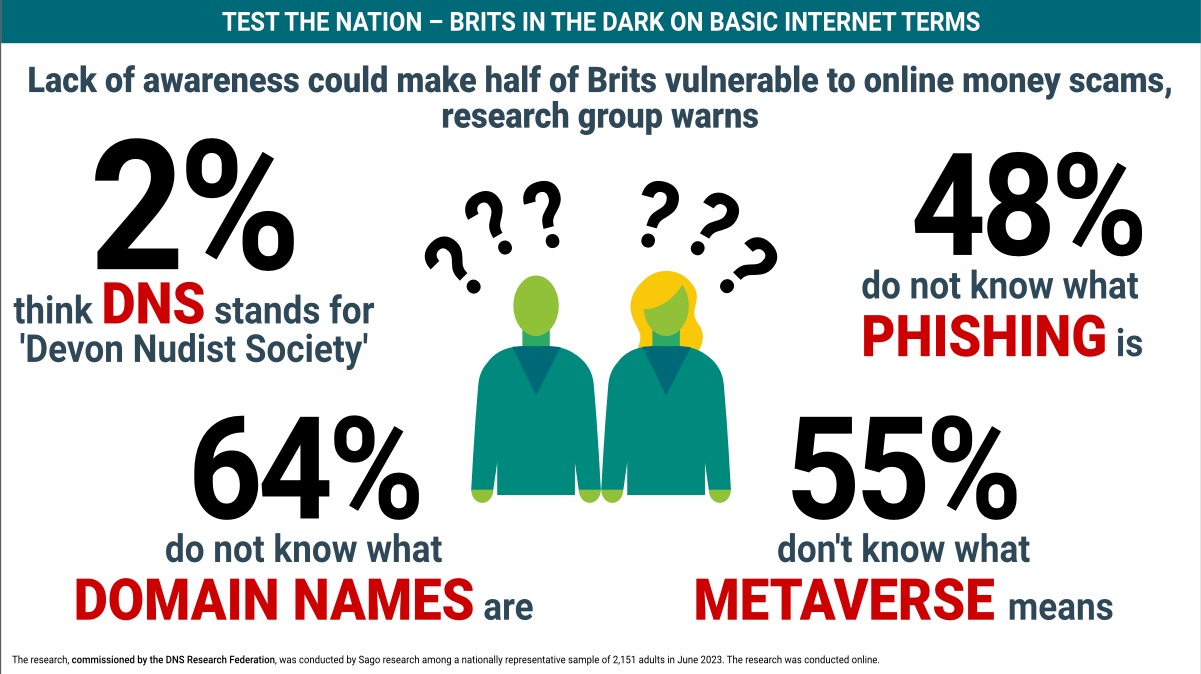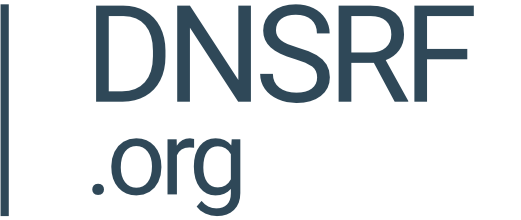Test the Nation - Brits in the Dark on the use of Basic Tech Terms

We use technology every day to buy goods, work, browse and connect with loved ones. But new research from The DNS Research Federation reveals between a half and two thirds of people are in the dark on what basic Internet terms actually mean – terms that help people stay safe online and avoid becoming a victim of criminal money scams or hacking.
With research revealing that as many as 30% of families in the UK have lost money to Internet scams - the equivalent of 5.7 million families across the country – The DNS Research Federation polled a representative sample of 2,151 people around the UK to explore how well people understood a range of key Internet terms - and to identify in which regions the knowledge gap was the widest.
What is a domain name?
- Only 36% knew a domain name was the name of a website you can type into your web browser to access it.
- Regional hotspots: people in London (31%) and the Midlands (35%) were least likely to know what a domain name is.
Of those that got it wrong:
- 20% of people in the North thought it was the name of an Internet service provider.
- 9% of Londoners thought it was a billing address for online payments – and 3% even thought it was a kingdom from the game Dungeons and Dragons.
What does DNS stand for?
- Nationally, only around one in four people (27%) knew that 27% DNS stood for Domain Name System.
- Regional hotspots: people in London (32%) and the South (37%) were least likely to know what DNS is.
Of those that got it wrong:
- 68% of Northern Irish respondents thought DNS was a name for a digital security network, a common misconception across the country.
- 8% of people in Wales thought DNS had something to do with Decrypted Neural Systems, whilst 4% of Londoners thought it was the official name for the Devon Nudist Society.
- Some Londoners (4%) also thought DNS was the official fan club name for the UK’s National Dinosaur Society.
What is phishing?
- Regional hotspot: Only around one in two people in the Midlands (52%) correctly identified phishing as the practice of sending emails purporting to be from reputable companies.
Of those that got it wrong:
- 13% of people in the Midlands thought phishing referred to a block of data sent by a webserver and stored on the browser.
- 10% of Londoners thought it was a brand of anti-virus software to protect computers, whilst 7% believed it to be an annual sporting event in the Scottish Highland Games - and 4% thought it was the name of Finland's heavy metal entry for Eurovision.
- 6% of Scots thought phishing was the name of a galaxy behind the moon.
- 12% of people in the North thought phishing to be a popular past time that involves catching fish.
What is Metaverse?
- Regional hotspots: People in London (55%) and North were least (58%) likely to know that Metaverse was a virtual space for real-time interactions.
Of those that got it wrong:
- In Northern Ireland, 43% of people believed it to be a computer program designed to simulate conversation with humans.
- 4% of Londoners thought Metaverse was the name of the planet where Darth Vader came from.
- 8% of Scots thought it was the name of a new Sci-Fi theme park at Euro Disney.
Emily Taylor, Chief Executive at The DNS Research Federation commented: “We initially conducted this research as a bit of fun, as we understand that most people find tech terms to be a complete switch-off. That said, at a time when a record number of UK consumers are unwittingly falling for money-grabbing Internet scams, now is the time where we all need to help empower consumers – and knowledge of the basics on how the Internet works will really help people to be safe online, to avoid the scammers and hackers. Our own data suggests that the average amount of money Brits lose to online scams has hit a national average of £1,169 per person, with 7% claiming to have lost more than £7,500 to scammers. This is an unacceptable situation; it is wrong for anyone to accept the prevalence of Internet crime as normal and no one should blame themselves for falling for a scam. Improving knowledge of basic Internet terms supports greater consumer empowerment and is the first line of defence against Internet crime.”
Emily Taylor is available for radio interviews
An international public speaker and regular broadcast commentator on cyber security issues, Emily is the editor of the Journal of Cyber Policy and Associate Fellow of the Chatham House International Security Department. She is CEO at The DNS Research Federation.
The first organisation of its kind, The DNS Research Federation is a not-for-profit organisation that believes passionately in safeguarding the Internet’s power to do good and improve society. The Federation’s mission is to advance the understanding of the Domain Name System's impact on cybersecurity, policy and technical standards.
For more information on DNS Research Federation or to request interviews with Emily Taylor, contact:
elephant communications
Guy Bellamy / Rebecca Ellis-Owen - elephant communications
07766 775216
Guy@elephantcommunications.co.uk / rebecca@elephantcommunications.co.uk


